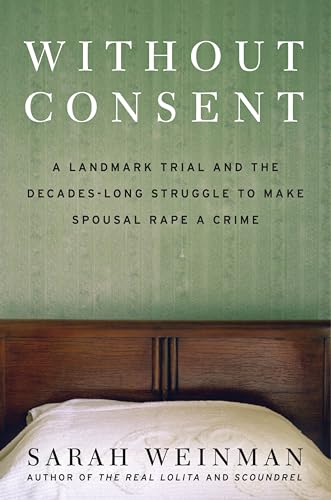What do you think?
Rate this book


320 pages, Hardcover
First published November 11, 2025
Feminism has tried to move on to different battles than those originally waged during its second wave, but it also must keep fighting those same battles, because nothing is ever truly a permanent win. That's because the main problems in American culture, even and especially the ones activists sought to overcome, remain the same: men feel entitled to the bodies and minds of women, and the idea that wives are "property" persisted—and, devastatingly, still persists today.*


Every state has some kind of law that criminalizes spousal rape. But ten of them, as of this writing, still won't prosecute if the victim was unconscious, drugged, or otherwise incapacitated.*
In Virginia, a man charged with raping his wife can get his charges reduced as long as he attends therapy sessions.*
West Virginia only began the process of eliminating its marital rape exemption loopholes for first- and third- degree sexual assault charges in 2024, finalizing a law that went into effect in June of that year.*
Trong thế giới bóng đá hiện đại, chiến thuật là linh hồn quyết định thành bại của một trận đấu. Chúng tôi hiểu rằng, đối với người hâm mộ, việc giải mã những sơ đồ phức tạp trên sân cỏ cũng hấp dẫn không kém việc thưởng thức một bàn thắng đẹp. Tại xoilac trực tiếp bóng đá, chúng tôi không chỉ mang đến những trận cầu đỉnh cao mà còn đi sâu vào phân tích chuyên môn. Hôm nay, chúng ta sẽ cùng nhau mổ xẻ hai hệ thống chiến thuật đang làm mưa làm gió: Sơ Đồ 3-4-3 Hiện Đại Và 4-3-3 Truyền Thống. Đây là cuộc đối đầu giữa hai triết lý, hai phong cách định hình nên bộ mặt của bóng đá đỉnh cao.
Mục tiêu của chúng tôi là cung cấp một cái nhìn toàn diện, giúp bạn không chỉ xem bóng đá mà còn "đọc" được trận đấu. Hãy cùng các chuyên gia của chúng tôi khám phá những ưu, nhược điểm và sự khác biệt cốt lõi giữa hai sơ đồ này để hiểu tại sao chúng lại được các huấn luyện viên hàng đầu thế giới tin dùng.
Sơ Đồ 3-4-3: "Cơn Lốc" Tấn Công Với Sức Ép Nghẹt ThởSơ đồ 3-4-3 đã trở thành một biểu tượng của lối chơi tấn công tổng lực và pressing tầm cao. Hệ thống này đòi hỏi sự linh hoạt, tốc độ và nền tảng thể lực dồi dào từ các cầu thủ. Chúng tôi nhận thấy rằng khi được vận hành trơn tru, 3-4-3 có thể bóp nghẹt đối thủ ngay từ phần sân nhà của họ.
Triết lý vận hành và sức mạnh cốt lõiNền tảng của sơ đồ 3-4-3 nằm ở khả năng tạo ra sự áp đảo về quân số ở cả hai biên và khu vực trung lộ. Với ba trung vệ án ngữ phía sau, hai tiền vệ cánh (wing-back) được giải phóng khỏi nhiệm vụ phòng ngự thuần túy, cho phép họ dâng cao như những tiền đạo cánh thực thụ. Điều này tạo ra một hàng công có thể lên tới 5 người, gây ra sức ép khủng khiếp và liên tục lên hàng phòng ngự đối phương. Cặp tiền vệ trung tâm có nhiệm vụ điều tiết nhịp độ và là cầu nối giữa các tuyến.
Ưu điểm tạo nên sự khác biệtƯu điểm lớn nhất của sơ đồ này là khả năng tấn công đa dạng và khó lường. Các wing-back liên tục khuấy đảo hai hành lang biên, trong khi bộ ba tiền đạo có thể hoán đổi vị trí linh hoạt, tìm kiếm khoảng trống. Hơn nữa, cự ly đội hình gần nhau giúp việc triển khai pressing tầm cao trở nên cực kỳ hiệu quả. Khi mất bóng, đội hình có thể nhanh chóng vây ráp, đoạt lại quyền kiểm soát và chuyển đổi trạng thái sang tấn công một cách chớp nhoáng.
Sơ Đồ 4-3-3: Biểu Tượng Của Sự Cân Bằng Và Kiểm SoátTrái ngược với sự táo bạo của 3-4-3, sơ đồ 4-3-3 truyền thống lại là hiện thân của sự cân bằng, ổn định và khả năng kiểm soát thế trận. Đây là hệ thống được nhiều đội bóng lớn ưa chuộng bởi nó tạo ra một cấu trúc vững chắc từ phòng ngự đến tấn công, đặt nền tảng cho lối chơi kiểm soát bóng.
Nền tảng của sự ổn địnhSức mạnh của 4-3-3 đến từ bộ ba tiền vệ ở khu vực trung tâm. Thường sẽ có một tiền vệ mỏ neo (số 6) chuyên trách nhiệm vụ phòng ngự, đánh chặn, và hai tiền vệ trung tâm (số 8) linh hoạt hơn, vừa hỗ trợ phòng ngự vừa tham gia tổ chức tấn công. Tam tấu này tạo ra một "tam giác" vững chắc, cho phép đội bóng kiểm soát khu vực giữa sân, từ đó áp đặt lối chơi lên đối thủ. Trên hàng công, hai tiền đạo cánh và một trung phong cắm tạo nên mối đe dọa thường trực.
Điểm mạnh trong kiểm soát và tấn côngSơ đồ 4-3-3 mang lại sự cân bằng tuyệt vời giữa các tuyến. Bốn hậu vệ tạo ra một lá chắn an toàn trước khung thành. Ba tiền vệ đảm bảo khả năng luân chuyển bóng mượt mà và kiểm soát nhịp độ trận đấu. Khi tấn công, các hậu vệ biên có thể dâng cao hỗ trợ, tạo ra các tình huống chồng biên nguy hiểm. Sự ổn định này giúp các đội bóng vận hành 4-3-3 ít bị tổn thương hơn trước các pha phản công nhanh của đối thủ.
Đặt Lên Bàn Cân: Sơ Đồ 3-4-3 Hiện Đại Và 4-3-3 Truyền ThốngKhi hai hệ thống chiến thuật này đối đầu trực tiếp, đó là một cuộc đấu trí thực sự giữa các huấn luyện viên. Mỗi sơ đồ đều có cách để khai thác điểm yếu của đối phương. Theo dõi các trận đấu tại xoilac trực tiếp bóng đá, chúng tôi đã đúc kết được những màn đối đầu chiến thuật kinh điển.
Cuộc chiến ở khu vực trung tuyến và hai biênTrong một cuộc đối đầu trực diện, sơ đồ 4-3-3 với ba tiền vệ trung tâm có thể chiếm ưu thế về quân số ở khu vực giữa sân so với hai tiền vệ của 3-4-3. Tuy nhiên, hệ thống 3-4-3 lại có thể khắc chế điều này bằng cách kéo các tiền đạo lùi sâu hoặc để các wing-back bó vào trong. Ngược lại, điểm yếu chí mạng của 3-4-3 là khoảng trống mênh mông phía sau lưng hai wing-back khi họ dâng cao. Đây chính là "miếng mồi ngon" để hai tiền đạo cánh tốc độ của sơ đồ 4-3-3 khai thác.
Yếu tố con người là chìa khóaKhông có sơ đồ nào là hoàn hảo tuyệt đối. Sự thành công của một hệ thống chiến thuật phụ thuộc hoàn toàn vào những cầu thủ trên sân. Sơ đồ 3-4-3 đòi hỏi những wing-back toàn diện "lên công về thủ" và những trung vệ thông minh, đọc tình huống tốt. Trong khi đó, 4-3-3 cần một tiền vệ mỏ neo đẳng cấp thế giới để làm tấm lá chắn và những tiền vệ trung tâm sáng tạo để làm bóng cho hàng công. Việc lựa chọn sơ đồ nào phụ thuộc vào triết lý của huấn luyện viên và đặc điểm của các cầu thủ mà họ có trong tay.
Lời kếtCuộc đối đầu giữa Sơ Đồ 3-4-3 Hiện Đại Và 4-3-3 Truyền Thống sẽ không bao giờ có hồi kết, bởi đó là bản chất của sự phát triển không ngừng trong bóng đá. Mỗi hệ thống đều đại diện cho một triết lý riêng và mang lại những vẻ đẹp khác nhau cho môn thể thao vua. Chúng tôi tại xoilac trực tiếp bóng đá hy vọng rằng qua bài phân tích này, quý vị khán giả đã có cái nhìn sâu sắc hơn về thế giới chiến thuật phức tạp nhưng đầy hấp dẫn. Việc hiểu rõ những toan tính đằng sau mỗi trận đấu chắc chắn sẽ làm tăng thêm sự phấn khích khi bạn theo dõi những cuộc thư hùng đỉnh cao.